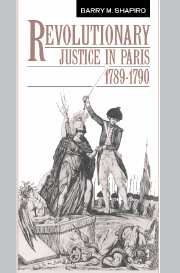Book contents
- Frontmatter
- Contents
- Preface
- Acknowledgments
- List of abbreviations
- Introduction
- 1 Revolutionary justice in 1789–1790: the Comité des Recherches, the Châtelet, and the Fayettist coalition
- 2 The judicial aftermath of the July Revolution
- 3 The Besenval affair: amnesty or prosecution?
- 4 Lafayette, Orléans, and the October Days
- 5 The post-October Days campaign against the left
- 6 The Favras conspiracy
- 7 The Favras–Besenval judicial transaction
- 8 The Maillebois conspiracy
- 9 The October Days affair and the radicalization of the Comité des Recherches
- 10 The Maillebois and October Days affairs: mutual amnesty and the breakup of the Fayettist coalition
- Conclusion
- Notes
- Select bibliography
- Index
- Frontmatter
- Contents
- Preface
- Acknowledgments
- List of abbreviations
- Introduction
- 1 Revolutionary justice in 1789–1790: the Comité des Recherches, the Châtelet, and the Fayettist coalition
- 2 The judicial aftermath of the July Revolution
- 3 The Besenval affair: amnesty or prosecution?
- 4 Lafayette, Orléans, and the October Days
- 5 The post-October Days campaign against the left
- 6 The Favras conspiracy
- 7 The Favras–Besenval judicial transaction
- 8 The Maillebois conspiracy
- 9 The October Days affair and the radicalization of the Comité des Recherches
- 10 The Maillebois and October Days affairs: mutual amnesty and the breakup of the Fayettist coalition
- Conclusion
- Notes
- Select bibliography
- Index
Summary
Whereas many nineteenth- and early twentieth-century French revolutionary historians tended to make a sharp distinction between the liberal revolution of 1789 and the Jacobin Revolution of 1793–4, the trend among recent generations of revolutionary scholars has been to view the Revolution as a self-contained process in which the developments of the later stages can be seen as being foreshadowed in the earlier or even pre-revolutionary stages. In recent years, this trend has been especially evident in the assertion of many influential revisionist scholars that the Jacobin dictatorship of 1793–4 and the Terror that accompanied it were rooted in pre-revolutionary “Rousseauian” ideology. For if the events of 1793–4 reflected a mature realization of pre-revolutionary ideology, then the events of the Revolution's earlier stages would logically fall into place as reflecting a less mature realization of the same ideology. As François Furet has written: “From the meeting of the Estates General to the dictatorship of the Committee of Public Safety, the same dynamic was at work; it was fully developed, though not yet supreme, as early as 1789.” Thus, for Furet:
There is no difference in kind between Marat in 1789 and Marat in 1793. Nor were the murders of Foulon and Berthier fundamentally different from the massacres of September 1792, any more than Mirabeau's aborted trial after the October Days of 1789 was different from the sentencing of the Dantonists in the spring of 1794.
- Type
- Chapter
- Information
- Revolutionary Justice in Paris, 1789–1790 , pp. 221 - 226Publisher: Cambridge University PressPrint publication year: 1993

